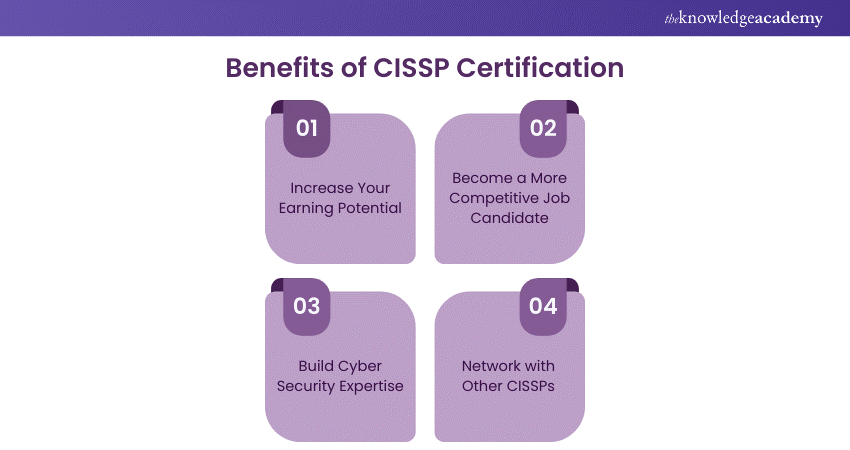We may not have the course you’re looking for. If you enquire or give us a call on +64 98874342 and speak to our training experts, we may still be able to help with your training requirements.
Training Outcomes Within Your Budget!
We ensure quality, budget-alignment, and timely delivery by our expert instructors.

As the digital age continues to take seismic strides across diverse industries and permeates our personal and professional lives with unprecedented connectivity, Cyber Security grows increasingly paramount. This blog delves into compelling CISSP Case Study examples, illustrating how this esteemed Certification has empowered reputed organisations globally. Join us as we explore the real-world success stories of CISSP-certified professionals and the significant impact they've made in their fields.
We hope these CISSP Case Study examples strengthen your grasp on the CISSP Certification and the evolving world of Information Technology as a whole.
Table of Contents
1) What is CISSP?
2) Benefits of CISSP Certification
3) Top CISSP Case Studies
a) Case Study 1: Capital One Data Breach
b) Case Study 2: Springhill Medical Center Ransomware Attack
c) Case Study 3: Microsoft Cloud Misconfiguration
d) Case Study 4: Insider Threat at Google
4) Conclusion
What is CISSP?
The Certified Information Systems Security Professional (CISSP) Certification is a globally recognised credential in the field of Information Security. It is designed for professionals who develop and manage policies and procedures in Cyber Security.
CISSP validates an individual's expertise and experience in managing and implementing a security program making it an asset for career growth.
Benefits of CISSP Certification
A CISSP Certification is often rightfully considered a gold standard for IT and Cyber Security professionals. It can result in higher salaries, a competitive edge in the job market, and knowledge of industry advancements. Let's explore some of its biggest benefits:

Increase Your Earning Potential
CISSP-certified professionals are some of the most well-paid IT professionals in the industry. This is because employers understand the rigorous process required to become a CISSP, and the credential is recognised on a global scale.
CISSP Certification can significantly boost your earning potential. On average, a CISSP-certified professional can earn around £43,820 (Glassdoor) per year in the UK.
Become a More Competitive Job Candidate
With cyber threats on the rise, organisations are in constant need of skilled Cyber Security professionals. Adding CISSP Certification to your Cyber Security resume signifies to recruiters and employers that you are among the top candidates in the Information Security industry.
This credential guarantees at least four to five years of hands-on experience. According to Statista, the global number of Cyber Security professionals has grown from 4.6 million to 5.45 million, an 18% increase, indicating a promising future.
Build Cyber Security Expertise
As part of the CISSP Certification process, candidates must possess in-depth understanding of every relevant Cyber Security information to pass the exam and maintain their Certification.
After earning their Certification, CISSPs must collect a set number of continuing education credits. This ongoing education helps them build expertise and ensure that CISSPs have relevant skills.
Consider these proven benefits of employing Cyber Security professionals with Certifications like the CISSP:
a) These workers have a deeper knowledge of critical Cyber Security topics.
b) Certified workers increase confidence in their teams’ ability to handle security challenges.
c) Hiring professionals with Cyber Security Certifications ensures up-to-date knowledge and practices in Information Security.
d) Certification allows organisations to recruit high-level workers with demonstrated expertise in Cyber Security.
Network with Other CISSPs
Earning your CISSP Certification opens doors to a global network of security professionals. This community offers valuable opportunities for networking and collaboration.
Engaging with other CISSPs can provide insights into industry trends, best practices, and innovative solutions, further elevating your professional growth.
Your dream job in Cyber Security is one prestigious course away. Sign up for our CISSP Certification now!
Top CISSP Case Study Examples
The following case studies will illustrate the significance and esteemed reputation of the CISSP Certification, highlighting its impact on enhancing Cyber Security practices and professional growth within various organisations
Case Study 1: Capital One Data Breach
In 2019, Capital One (the eighth largest bank in the US) experienced a significant data breach where a hacker gained unauthorised access to the personal information of over 100 million customers.
The breach occurred because of a misconfigured web application firewall which allowed the attacker to exploit a vulnerability and access sensitive data stored on Amazon Web Services (AWS) servers.
Key CISSP Concepts:
a) Security and Risk Management: The breach highlighted the importance of regular security assessments and compliance with security standards.
b) Asset Security: Ensuring proper configuration and protection of data stored in the cloud.
c) Security Operations: Incident response planning and execution were critical in mitigating the impact of the breach.
Key Lessons:
a) Regular review and updating of security configurations are vital.
b) Implementation of robust monitoring and alerting systems is necessary.
c) Conducting thorough security training for employees to recognise and respond to potential threats is of high importance.
Case Study 2: Springhill Medical Center Ransomware Attack
In July 2019, Springhill Medical Center in Mobile, Alabama, got hit by a ransomware attack This attack crippled its internal network systems and disrupted hospital operations, forcing medical personnel to use manual processes to continue providing care.
Key CISSP Concepts:
a) Security Operations: A well-defined incident response plan is vital for mitigating the impact of security breaches. It outlines the essential procedures for identifying, responding to, and recovering from security incidents.
b) Security Assessment and Testing: Conducting regular vulnerability assessments is of paramount importance to identify and address potential security weaknesses within an organisation's IT infrastructure. These assessments involve scanning systems, networks, and applications to detect vulnerabilities that could draw attackers.
c) Identity and Access Management (IAM): Identity and Access Management (IAM) can control whoever has access to an organisation's resources and ensuring that access is granted appropriately. Implementing IAM involves establishing policies and technologies for managing user identities and enforcing access controls.
Key Lessons:
a) It's vital to maintain regular backups and ensure they are not connected to the main network.
b) It’s highly important to implement network segmentation to limit the spread of ransomware.
c) It’s crucial to train staff on recognising phishing attempts and other common attack vectors.
Case Study 3: Microsoft Cloud Misconfiguration
In 2022, Microsoft researchers accidentally exposed nearly 38 Terabytes of confidential data by misconfiguring access controls on an Azure storage account. This incident spotlighted the risks associated with Cloud misconfigurations and the importance of robust security practices.
Key CISSP Concepts:
a) Asset Security: Effective asset security involves ensuring that Cloud resources are correctly configured and managed to prevent unauthorised access and data breaches. This includes setting up secure configurations, applying patches regularly, and implementing encryption to protect data both at rest and in transit.
b) Security Engineering: Security Engineering focuses on integration of secure design principles into cloud environments to build resilient systems. This includes adopting a zero-trust model and embedding security throughout the software development lifecycle.
c) Security Operations: Continuous auditing of cloud configurations are essential for maintaining a secure cloud environment. This involves using automated tools to monitor cloud resources for misconfigurations and compliance with security policies.
Lessons Learned:
a) Regularly auditing cloud configurations to ensure they meet security standards is of paramount importance.
b) The significance of implementing automated tools to detect and remediate misconfigurations.
c) Educating teams on Cloud Security best practices should be priority.
Case Study 4: Insider Threat at Google
In 2018, a Google Engineer was found to have leaked proprietary information to a competitor. This insider threat incident highlighted the importance of monitoring and managing employee access to sensitive information.
Key CISSP Concepts:
a) Identity and Access Management (IAM): IAM is vital for protecting sensitive information by ensuring that employees have access only to those data and systems required for their roles. This involves implementation of the principle of least privilege, where access rights are minimised to essential functions.
b) Security Assessment and Testing: Regular security testing and assessments help in identification and mitigation of potential insider threats. This process involves conducting vulnerability assessments, penetration tests and security audits for evaluation of the effectiveness of existing security controls.
c) Security and Risk Management: Developing comprehensive policies and procedures is vital for mitigating insider threats. These policies should define acceptable use, data protection standards, and strict protocols for reporting suspicious activities.
Lessons Learned:
a) The importance of strict access controls implementation and regular review of access permissions.
b) Monitoring employee activities for signs of potential insider threats.
c) Nurturing a security-aware culture within the organisation.
Looking for a secure future in the world of IT Security? Our Information Systems Security Management Training will help you achieve it. Sign up now!
Conclusion
The CISSP Certification is a testament to excellence in Cyber Security, inculcating professionals with the knowledge and skills to tackle complex security challenges. These real-world CISSP Case Study examples show how this Certification empowers individuals and organisations to achieve remarkable success. Whether it's enhancing earning potential, becoming a competitive job candidate, or building expertise, we hope this blog inspires you to unlock your CISSP potential
Want to navigate the world IT Security with ease as a professional? Sign up for our CISSP-ISSAP Training & Certification now!
Frequently Asked Questions

CISSP Certification benefits professionals by providing them expertise, recognition, global credibility and an expanding network within the Cyber Security community.

The eight domains of CISSP are:
1) Security and Risk Management
2) Asset Security
3) Security Architecture and Engineering
4) Communications and Network Security
5) Identify and Access Management
6) Security Assessment and Testing
7) Security Operations
8) Software Development Security

The Knowledge Academy takes global learning to new heights, offering over 30,000 online courses across 490+ locations in 220 countries. This expansive reach ensures accessibility and convenience for learners worldwide.
Alongside our diverse Online Course Catalogue, encompassing 17 major categories, we go the extra mile by providing a plethora of free educational Online Resources like News updates, Blogs, videos, webinars, and interview questions. Tailoring learning experiences further, professionals can maximise value with customisable Course Bundles of TKA.

The Knowledge Academy’s Knowledge Pass, a prepaid voucher, adds another layer of flexibility, allowing course bookings over a 12-month period. Join us on a journey where education knows no bounds.

The Knowledge Academy offers various CISSP Training, including the CISSP-ISSAP Training & Certification Course and Chief Information Security Officer Training. These courses cater to different skill levels, providing comprehensive insights into CISSP.
Our IT Security & Data Protection Blogs cover a range of topics related to CISSP, offering valuable resources, best practices, and industry insights. Whether you are a beginner or looking to advance your Cyber Security skills, The Knowledge Academy's diverse courses and informative blogs have got you covered.
Upcoming IT Infrastructure & Networking Resources Batches & Dates
Date
 CISSP Certification
CISSP Certification
Mon 6th Jan 2025
Mon 24th Mar 2025
Mon 19th May 2025
Mon 14th Jul 2025
Mon 8th Sep 2025
Mon 17th Nov 2025







 Top Rated Course
Top Rated Course



 If you wish to make any changes to your course, please
If you wish to make any changes to your course, please


